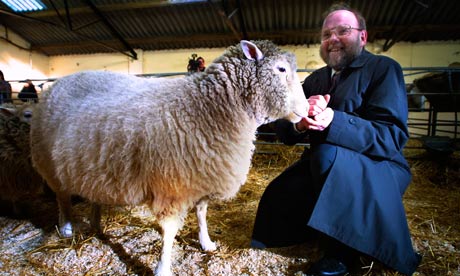January 30, 2012 /
Scientists in Edinburgh who pioneered cloning have made a technological breakthrough that could pave the way for better medical treatment of mental illnesses and nerve diseases

Scientist Ian Wilmut with Dolly, the worlds first cloned sheep, at the Roslin Institute near Edinburgh in 2001. Photograph: Murdo Macleod
The news that Edinburgh scientists had created the world’s first cloned mammal, Dolly the sheep, at the university’s Roslin Institute made headlines around the world 16 years ago. Her birth raised hopes of the creation of a new generation of medicines – with a host of these breakthroughs occurring at laboratories in the university over the following decade.
And now one of the most spectacular has taken place at Edinburgh’s Centre for Regenerative Medicine, where scientists have continued to develop the technology used to make Dolly. In a series of remarkable experiments, they have created brain tissue from patients suffering fromschizophrenia, bipolar depression and other mental illnesses.
The work offers spectacular rewards for doctors. From a scrap of skin taken from a patient, they can make neurones genetically identical to those in that person’s brain. These brain cells, grown in the laboratory, can then be studied to reveal the neurological secrets of their condition.
“A patient’s neurones can tell us a great deal about the psychological conditions that affect them, but you cannot stick a needle in someone’s brain and take out its cells,” said Professor Charles ffrench-Constant, the centre’s director.
“However, we have found a way round that. We can take a skin sample, make stem cells from it and then direct these stem cells to grow into brain cells. Essentially, we are turning a person’s skin cells into brain. We are making cells that were previously inaccessible. And we could do that in future for the liver, the heart and other organs on which it is very difficult to carry out biopsies.”
The scientists are concentrating on a range of neurological conditions, including multiple sclerosis, Parkinson’s disease and motor neurone disease. In addition, work is being carried out on schizophrenia and bipolar depression, two debilitating ailments that are triggered by malfunctions in brain activity. This latter project is directed by Professor Andrew McIntosh of the Royal Edinburgh Hospital, who is working in collaboration with the regenerative medicine centre.
Help us to educate $ DONATE NOW PLEASE $
“MS Views and News” is a 501©(3) Not-For-Profit organization
as recognized by the Internal Revenue Service
All contributions are tax deductible to the fullest extent allowed by law
~~~~~~~~~~~~~~~~~~~~~~~~~~~~~~~~~~~~~~~~~~~~~~~~~~~~~~~~
Disclaimer: ‘MS Views and News’ (MSVN), does not endorse any products or services found on this blog. It is up to you to seek advice from your healthcare provider. The intent of this blog is to provide information on various medical conditions, medications, treatments, and procedures for your personal knowledge and to keep you informed of current health-related issues. It is not intended to be complete or exhaustive, nor is it a substitute for the advice of your physician. Should you or your family members have any specific medical problem, seek medical care promptly.
…………………………
Visit our MS Learning Channel on YouTube: http://www.youtube.com/msviewsandnews
Stay informed with MS news and information - Sign-up here
For MS patients, caregivers or clinicians, Care to chat about MS? Join Our online COMMUNITY CHAT



